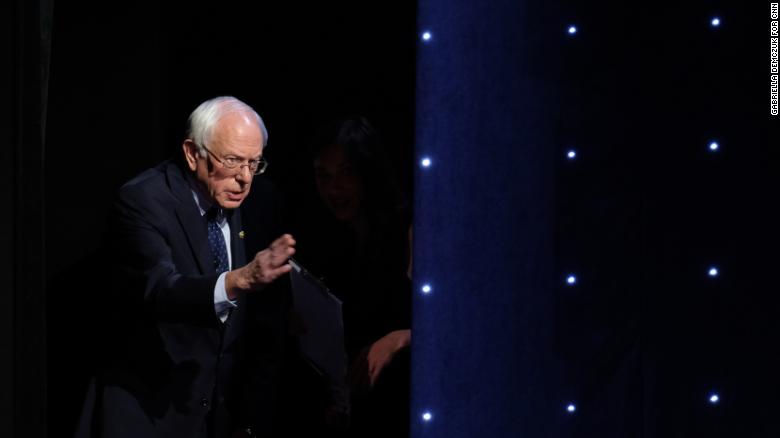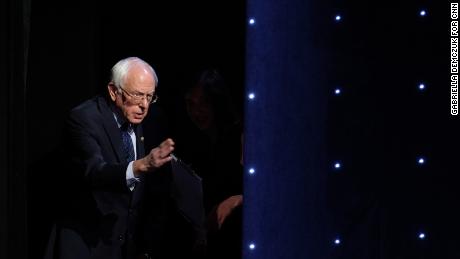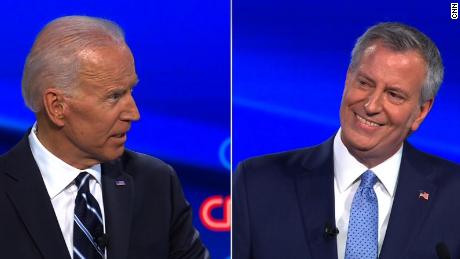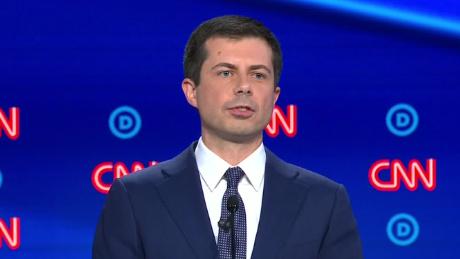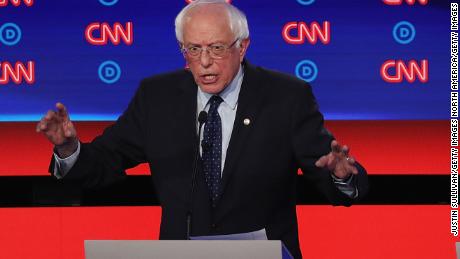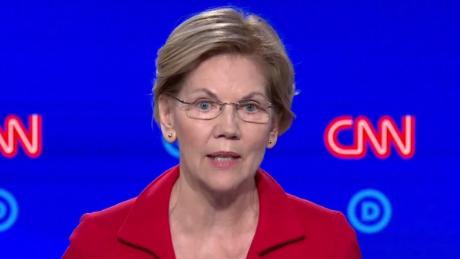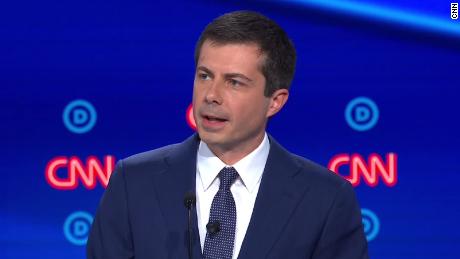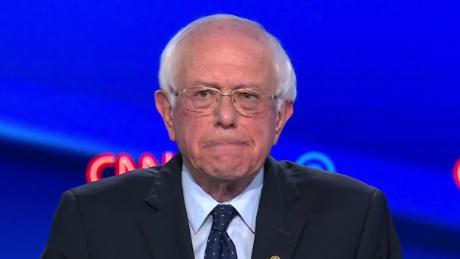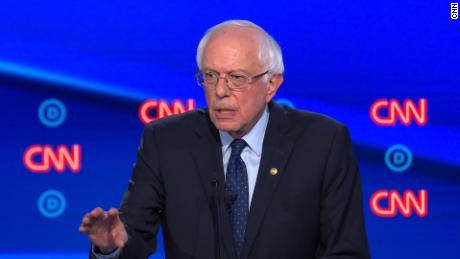(CNN)Welcome to CNN's fact check of the second round of Democratic debates.
Just as we did during the first debates, the Facts First team spent the night fact-checking candidates' claims from the stage in Detroit.
Here are the facts.
Amazon and taxes
Sen. Bernie Sanders claimed that Amazon pays not "one nickel" in federal income taxes.
"Companies like Amazon that made billions in profits did not pay one nickel in federal income tax."
Facts First: Sanders is correct ŌĆö for the previous two tax years, Amazon's own financial filings showed that it expected to receive money back from the federal government, not that it owed money.
According to an analysis by the Institute on Taxation and Economic Policy for the second year running, Amazon made a profit of more than $11 billion in 2018, but reported a $129 million tax rebate from the federal government.
Amazon does pay state taxes, and has also paid federal taxes in the past. The Wall Street Journal reported recently that Amazon's overall tax rate from 2012 through 2018 was 8%."From 2012 through 2018, Amazon reported $25.4 billion in pretax US income and current federal tax provisions totaling $1.9 billion," the Journal reported. "That is an 8% tax rate ŌĆö low, but not zero or negative. Looking back further, since 2002, Amazon has earned $27.7 billion in global pretax profits and paid $3.6 billion in global cash income taxes, a 13% tax rate."
Amazon's SEC filings in 2017 show it did not expect to owe any federal tax, and in fact expected to get a $137 million refund from the federal government. It did, however, say it expected to pay $211 million to states.
-Brian Fung
Climate crisis
Pete Buttigieg said that "Science tells us we have 12 years before we reach the horizon of catastrophe when it comes to our climate."
Facts First: Buttigieg is likely referring here to the definitive UN report that put the impacts of the climate crisis into stark relief.
The report did not set a 12-year deadline for "the horizon of catastrophe," though some politicians and media outlets have characterized it as such.
The science that Buttigieg was referring to comes from the United Nations Intergovernmental Panel on Climate Change (IPCC) report published in 2018.
The report was created to assess the impact of global warming and predicted what could happen if the planet warmed to 1.5 degrees Celsius above pre-industrial levels. The report did look at what could happen in 2030, 12 years from the date of publication, but the authors of the report have said that they picked that date to be helpful countries that had promised to meet deadlines to reduce carbon emissions set under the Paris climate accord.
The report did find that if the planet was able to keep warming to 1.5 degrees Celsius or under, countries would have to reduce about 45% of human-caused carbon dioxide emissions by 2030.
-Jen Christensen
The paycheck-to-paycheck experience
Vermont Sen. Bernie Sanders said "half of the American people are living paycheck to paycheck."
Facts First: It's unclear what data Sanders is referring to here. However, one authoritative source shows he's overestimating this figure slightly. National data on the paycheck-to-paycheck experience is hard to pin down, but a recent report from the Federal Reserve indicates that roughly 40% of Americans would have trouble covering an emergency expense of $400.
A relatively small and unexpected expense like a busted car or replacing a dishwasher can be a problem for many families without "adequate savings," according to the report.
When faced with an emergency expense of $400, 61% of Americans in 2018 say they could cover it either by using cash, savings, or a credit card paid off in the next billing period.
However, the remaining four out of 10 Americans would have much more difficulty covering the expense. And another 12% said they would be unable to pay their current month's bills if an unexpected $400 expense came up.
-Donna Borak
Family separation law
Sen. Elizabeth Warren said the current US law allows the President to separate migrant children from their parents at the border.
Facts First: This is true.
Last year, the Trump administration implemented its controversial "zero tolerance" policy, using a section of US law to criminally prosecute all adults who illegally crossed the southern border therefore leading to the separation of thousands of families, given that children can't be held in federal jail with adults. The policyŌĆöand the section of the code at the center of itŌĆöhave become a flashpoint in the immigration debate.
Democratic candidates remain divided over the law, referred to as Section 1325, with some wanting to instead make crossing the border illegally a civil offense, instead of a criminal offense. Warren is in favor of decriminalizing border crossings.
"So the problem is that right now the criminalization statute is what gives Donald Trump the ability to take children away from their parents. It's what gives him the ability to lock up people at our borders. We need to continue to have border security and we can do that, but what we can't do is not live our values," Warren said.
-Priscilla Alvarez
Background checks
Pete Buttigieg said that 80 to 90% of Republicans want "universal background checks."
Facts First: True, according to a major pollster.
According to a March Quinnipiac University poll, universal background checks have 89% support among Republicans. That's the same percentage as a January poll from the same organization.
Overall, support for universal background checks has ranged from 88 to 97% since February 2013, according to Quinnipiac polling.
-Kay Guerrero
Drug and insurance companies
Bernie Sanders says drug and insurance companies spent $4.5 billion on lobbying and campaigns.
Sanders said: "Over the last 20 years the drug companies and insurance companies have spent $4.5 billion of your health insurance money by lobbying and campaigning contributions."
Facts First: True -- and that could even be a low estimate.
Pharmaceutical companies and health-service companies, including insurance giants, such as UnitedHealth Group, and lab companies, such as Quest Diagnostics, spent about $4.1 billion dollars on lobbying and contributions to congressional candidates since 1998. That's according to data, not adjusted for inflation, compiled by the Center for Responsive Politics. But that figure does not include contributions by individuals to presidential or state-level campaigns.
When looking at the health sector as a whole, which also includes hospitals and professional associations, that figure jumps to $8.8 billion on lobbying alone over the same period.
-Curt Devine and Aaron Kessler
Medicare payments to hospitals
Former Maryland Rep. John Delaney blasted Vermont Sen. Bernie Sanders' Medicare for All plan, saying it would hurt the American health care system because Medicare doesn't pay providers enough.
"Medicare does not cover the cost of health care. It covers 80% of the cost of health care in this country, and private insurance covers 120%,"said Delaney, adding that rural hospital administrators say they'd have to close if they were paid Medicare rates.
Fact First: It's true that Medicare pays less than private health insurers and that hospitals depend on private insurers to make up the difference, but it's unclear if he's right that a Medicare for All plan would result in widespread hospital closures.
Just how much hospitals and physicians would be paid under Medicare for All -- and other proposals to create government-backed health insurance plans -- is a major issue. It's one reason why hospitals and doctors are so opposed to the concept.
Sanders' Medicare for All bill says that hospitals would be paid using the same approach as Medicare, though it doesn't specify the rates.
There are a variety of studies that show the difference between what Medicare and private insurers pay.
Delaney's press team said the candidate is citing a 2014 CNN analysis of "allowed charges" for five common procedures, using data provided the Centers for Medicare and Medicaid Services and Truven Health Analytics, a research firm. Overall, Medicare's allowed charges are roughly 80% of the charges allowed by private insurers.
According to the American Hospital Association, Medicare payments only covered 87% of hospital costs in 2016. But private insurers paid nearly 145% of patients' hospital costs.
When it comes to physician payments, The Journal of American Medicine, citing a 2018 study from the Congressional Budget Office, noted that private insurers paid 110% of Medicare rate for office visits, 130% for cataract surgeries and 180% for knee replacements and colonoscopies.
Hospitals say that current Medicare rates aren't enough to pay their bills.
"Hospitals are already paid far less than the cost of caring for Medicare patients, and more patients with Medicare would strain hospitals even more, and could threaten hospitals' survival," wrote Rick Pollack, chief executive of the association, in a blog post earlier this year.
-Tami Luhby
Impact of trade on the auto industry
Bernie Sanders said: "I'm delighted that Detroit is rebounding, but let us understand Detroit was nearly destroyed because of awful trade policy which allowed corporations to throw workers in this community out on the streets as they moved to low wage countries."
Facts First: Sanders is right that trade policy was a factor in the decline of Detroit's auto industry -- but it wasn't the only reason. Competition between unionized Rust Belt plants and non-unionized plants in the South also played a role.
Sanders often talks about the impact of the North American Free Trade Agreement, which went into effect in 1994, but auto manufacturing employment in the Detroit metropolitan area stayed steady through the 1990s. The Congressional Research Service has found that NAFTA made the North American auto sector more integrated, but it does not appear to have cost the US a significant number of jobs across the broader economy.
The problem for Michigan specifically was the rise of non-union manufacturing in the South ŌĆö foreign auto companies set up shop in states like South Carolina and Tennessee, and the Detroit automakers followed suit.
Auto jobs in Detroit went into steady decline starting in 2002, following the entry of China into the World Trade Organization, which research from MIT economists has suggested took the largest toll on American manufacturing by allowing for cheaper imports.
Automation has also taken a toll on the auto industry. Automobile manufacturing output used to grow roughly in proportion to employment, but that relationship reversed itself after the Great Recession, according to data from the Bureau of Economic Analysis and Bureau of Labor Statistics.
-Lydia DePillis
Electability
During a discussion about electability, Sen. Bernie Sanders claimed, "Every credible poll that I have seen has me beating Donald Trump."
Facts First: It's true. National polls do show Bernie Sanders beating President Donald Trump in a match up.
In a sampling of three recent credible polls (Fox, NBC/WSJ and CNN) conducted from the end of April through mid-July, Sanders was ahead of Trump by more than the margin of error.
CNN's poll in April had Sanders over Trump by six points. The poll had a margin of error of 5.6 points.
But polls also show that former vice president Joe Biden polls even better than Sanders against Trump. And 43% of voters believe that Biden has the best chance to beat Trump, according to a June CNN poll, way more than any other candidate. (Sanders came in second, with 13% of voters.)
-Alex Rogers and Clare Foran
Gun deaths in the US
Beto O'Rourke said: "We lose nearly 40,000 people in this country to gun violence, a number that no other country comes even close to."
Facts First: He's right about the total number, but not the comparison, based on data CNN found.
A CNN analysis of data from the Centers for Disease Control and Prevention's WONDER database found that 39,773 people died by guns in 2017, a record high, including by suicide and homicide.
However, the most recent study CNN could find by a credible source, found that gun deaths in Brazil outpaced the US.
In 2016, there were 43,200 gun deaths in Brazil compared to 37,200 in the United States, according to a study funded by the funded by the Bill & Melinda Gates Foundation and published in JAMA.
-Geneva Sands
US vs. Canadian health care spending
Vermont Sen. Bernie Sanders praised Canada's health care system, which has a universal public health insurance program.
"They spend half of what we spend," said Sanders, who on Sunday traveled north with Americans with diabetes to buy cheaper insulin there.
Facts First: Sanders is right that the US spends twice as much as Canada per person on health care, according to one major study.
In fact, the US spends far more than all other developed countries, according to a study earlier this year from Johns Hopkins Bloomberg School of Public Health.
The US spent $9,892 in health care spending per person in 2016, while Canada spent $4,753.
The median spending for countries in the Organization for Economic Cooperation and Development (OECD) was $4,033.
-Tami Luhby
Military spending
Sen. Bernie Sanders claimed that the US spends more on military than the next 10 nations combined.
Facts First: Sanders is in the ballpark, but not quite right. Sanders was correct according to data published in February by a leading source of military spending information. But as of a recent update to that data, he is now very slightly off.
The International Institute for Strategic Studies (IISS) reported in February that the US spent $643 billion in 2018. The next 10 countries spent $642 billion. But the institute told CNN in June that they have since updated the data. Now the US figure is $631 billion, while the figure for the next 10 countries is $643 billion. Due to that update, the US spent more than the next nine countries combined, not the next 10.
There are other reliable sources that have slightly different data than IISS.
The Peter G. Peterson Foundation calculates US defense spending to be $609 billion and their math, based on Stockholm International Peace Research Institute data, shows the US figure to be bigger than the next 7 nations combined.
-Kylie Atwood
US debt held by China
Former Colorado Gov. John Hickenlooper claimed China owns 25% of total US debt -- something he suggested is a problem for President Donald Trump's efforts to negotiate a trade deal with Beijing.
"You're not going to win against China in a trade war when they have 25% of our total debt," he said.
Facts First: This is false. China is indeed the biggest foreign holder of US debt, but it owns less than Hickenlooper claimed.
In May, Beijing's holdings amounted to $1.1 trillion, or 17% of all foreign-held Treasury bills and notes, according to data from the Treasury Department. That's down from more than 19% in June last year.
Foreign holders also only account for a fraction of America's creditors.
The United States actually shoulders the majority of its debt burden by itself through the Federal Reserve and local investors. Foreign investors owned just under 30% of the total outstanding debt at the end of the first quarter.
Total US public debt amounted to $22.03 trillion at the end of March, of which $6.47 trillion were held by foreign investors, according to data from the Federal Reserve Bank of St. Louis and the Treasury.
-Anneken Tappe
Hate crimes
Beto O'Rourke claimed that "hate crimes are on the rise every single one of the last three years."
Facts First: This is true based on available data for 2015 to 2017, but there is no official government data for 2018 yet.
The FBI's Uniform Crime Reporting Program's annual Hate Crime Statistics report released last year found that 7,175 hate crimes were reported by law enforcement agencies in 2017 -- up from 6,121 in 2016 and 5,850 in 2015.
Jurisdictions don't have to share their hate crimes data, and not all victims will file a formal report which makes a count of unreported incidents unclear.
The Justice Department said in 2017 that the majority of hate crimes go unreported to law enforcement.
At the time, DOJ cited the Bureau of Justice Statistics' National Crime Victimization Survey, which found that between 2011 and 2015, 54% of hate crimes went unreported.
The number of agencies reporting to the FBI on hate crimes from last year's report has also increased by about 1,000.
-Maegan Vazquez
Job losses from trade agreements
Vermont Sen. Bernie Sanders said that NAFTA and permanent normal trade relations with China cost the US "over 4 million jobs."
Facts First: This is likely an overestimate of the impact trade agreements have had on US employment.
Most estimates find that the North American Free Trade Agreement had little if any impact on national employment levels, though the effect was uneven across regions and industries.
The entry of China into the World Trade Organization in 2001 likely had a much larger impact because of sudden competition from cheaper imports.
But even the high end of job loss estimates, from the left-leaning Economic Policy Institute, found that the change in trade status for China caused a loss of 3.4 million jobs between 2001 and 2017.
Another estimate, from a 2016 study by economists at the Massachusetts Institute of Technology, found that normalizing trade relations with China cost the US between 2 million and 2.4 million jobs between 1999 and 2011.
-Lydia DePillis
Trans-Pacific Partnership
Former Maryland Rep. John Delaney said he is "the only one running for president who supports the Trans-Pacific Partnership."
Facts First: Delaney, based on the public statements we found, is correct that he is the only 2020 Democrat who currently supports the Obama-era pact as is. Trump nixed the deal upon taking office.
John Hickenlooper supported TPP in 2015 and his campaign says Trump missed out on economic growth by pulling out. He now says he would seek changes to the deal to benefit workers.
Three other candidates previously expressed varying degrees of support for the 11-nation trade deal, but they have come out against it and -- or have avoided taking a firm stance on the issue since. That includes former Vice President Joe Biden, who advocated for the trade deal when Obama was pushing for it but now won't say how he would land on the issue. His campaign declined to state how Biden feels about TPP today when The Atlantic asked 23 Democratic presidential candidates about the trade deal in June.
TPP never received a vote in Congress, but former Texas Rep. Beto O'Rourke and Colorado Sen. Michael Bennet did vote for a related issue, known as Trade Promotion Authority, which Obama planned to use to approve the TPP.
O'Rourke told Vanity Fair in March that he would have voted no on the final product. Bennet also says he didn't ultimately support TPP. He did call for revisiting talks during an interview with the Los Angeles Times earlier this month.
-Haley Byrd
Systemic racism
In discussing systemic racism, Pete Buttigieg said, "If you walk into an emergency room, your reports of pain will be taken less seriously. If you apply for a job and you are black, you are less likely to be called because of the name on the resume."
Facts First: Studies conducted by major institutions support Buttigieg's claim.
An article published by the National Center for Biotechnology Information, part of the National Institutes of Health, found that black patients waited longer than others for emergency care. However, when the illness was extremely severe, the disparity was less pronounced.
Discrimination against black applicants in the hiring process remains as prevalent in 2015 as it was in 1989, according to a 2017 study by researchers at Northwestern University, Harvard, and the Institute for Social Research in Norway.
The study found that on average, "white applicants receive 36% more callbacks than equally qualified African Americans."
The hiring issue was also addressed in a 2016 study by professors at Stanford, and the University of Toronto titled, "Whitened Resumes: Race and Self-Presentation in the Labor Market."
A Harvard Business School article said the research in that study showed that "companies are more than twice as likely to call minority applicants for interviews if they submit whitened resumes than candidates who reveal their race."
-Tara Subramaniam

